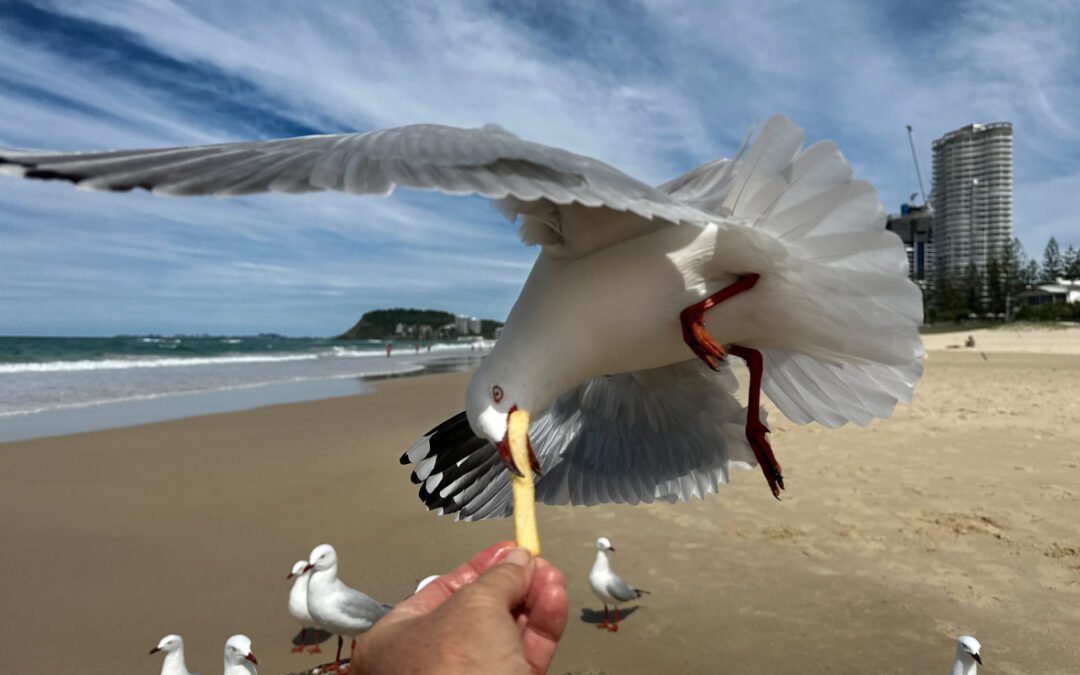The Cheesy Toast Stack, a popular sandwich shop in St Andrews, has introduced a unique countermeasure against an unusual problem: seagull theft. Dubbed ‘seagull insurance’, this initiative gives customers the option to pay an additional £1 to safeguard their purchase against aerial bandits.

Angry seagull with open beak
Sam Larg, the founder of The Cheesy Toast Stack, spoke to The Telegraph about the challenges his business faces with the increasing boldness of local seagulls. During the peak summer months, the problem of these birds swooping down to snatch customers’ food has intensified. “Replacing up to 10 sandwiches a day has pushed us to think innovatively about solutions,” Larg commented. With 10 years in business, this summer has been notably problematic, marked by frequent disturbances from the birds.
The new insurance scheme was conceived as a way to manage the financial burden of providing free replacements for stolen food. Larg expressed his concern about the sustainability of their previous approach: “It always felt cold-hearted to turn down a customer for a replacement, but continuously offering free meals is becoming untenable for our business.”
The insurance option is not just a business move but also carries a community spirit. Larg plans to donate any profits from the insurance at the end of the season to local entities, such as the football club and charities. This gesture aims to support community initiatives while addressing the shop’s operational challenges.
The background to this peculiar issue was highlighted by recent research from Emma Inzani of the Centre for Ecology and Conservation at Exeter’s Penryn Campus. Her study on seagull behaviour indicates that while these birds do occasionally steal human food, they show a natural preference for their traditional diet of fish, such as mackerel and sprat. Inzani suggests that reduced fish availability in UK waters might be driving the gulls to adapt to more urban food sources. “Although urban foods are more accessible, seagulls still choose fish whenever possible, which is less energy-consuming than scavenging in urban areas,” she explained.
Pigeon Patrol
Pigeon Patrol Products & Services is the leading manufacturer and distributor of bird deterrent (control) products in Canada. Pigeon Patrol products have solved pest bird problems in industrial, commercial, and residential settings since 2000, by using safe and humane bird deterrents with only bird and animal friendly solutions. At Pigeon Patrol, we manufacture and offer a variety of bird deterrents, ranging from Ultra-flex Bird Spikes with UV protection, Bird Netting, 4-S Bird Gel and the best Ultrasonic and audible sound devices on the market today.
Canada’s top wholesaler for bird deterrent products for twelve consecutive years.
Contact us at 1- 877– 4– NO-BIRD, (604) 585-9279 or visit our website at https://www.pigeonpatrol.ca/
Bird Gone, Pigeon Gone, Pigeon problems, pigeon spikes, 1-877-4NO-BIRD, 4-S Gel, Bird Control, Pigeon Control, bird repellent, Bird Spikes, sonic bird repellent, stainless steel bird spikes, bird spikes Vancouver, Ultra Sonic Bird Control, Bird Netting, Plastic Bird Spikes, Canada bird spike deterrents, Pigeon Pests, B Gone Pigeon, Pigeon Patrol, pest controller, pest control operator, pest control technician, Pigeon Control Products, humane pigeon spikes, pigeon deterrents, pigeon traps, Pigeon repellents, Sound & Laser Deterrents, wildlife control, raccoon, skunk, squirrel deterrent, De-Fence Spikes, Dragons Den, Pigeon, Pigeon Patrol, Pigeons Roosting, Vancouver Pigeon Control, Bird Spikes, Bird Control, Bird Deterrent, Pigeon Deterrent, Surrey Pigeon Control, Pest, Seagull deterrent Vancouver Pigeon Blog, Birds Inside Home De-fence, Pigeon Nesting, Bird Droppings, Pigeon Dropping, woodpecker control, Keep The Birds Away, Birds/rats, seagull, pigeon, woodpecker, dove, sparrow, pidgeon control, pidgeon problem, pidgeon control, flying rats, pigeon Problems, bird netting, bird gel, bird spray, bird nails, bird guard, Pigeon control, Bird deterrents, Pigeon deterrents, Bird control, solutions, Pigeon prevention, Pigeon repellent, Bird proofing, Pest bird management, Pigeon spikes, Bird netting, Humane bird control, Bird exclusion, Urban bird control, Anti-roosting devices, Pigeon removal, Bird barriers

